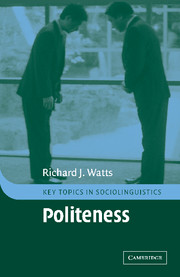Book contents
- Frontmatter
- Contents
- Preface
- 1 Introducing linguistic politeness
- 2 Politeness through time and across cultures
- 3 Modelling linguistic politeness (I)
- 4 Modelling linguistic politeness (II): Brown and Levinson and their critics
- 5 Facework and linguistic politeness
- 6 A social model of politeness
- 7 Structures of linguistic politeness
- 8 Relevance Theory and concepts of power
- 9 Politic behaviour and politeness in discourse
- 10 Politic behaviour and politeness within a theory of social practice
- Notes
- Glossary of terms
- References
- Index
9 - Politic behaviour and politeness in discourse
Published online by Cambridge University Press: 24 November 2009
- Frontmatter
- Contents
- Preface
- 1 Introducing linguistic politeness
- 2 Politeness through time and across cultures
- 3 Modelling linguistic politeness (I)
- 4 Modelling linguistic politeness (II): Brown and Levinson and their critics
- 5 Facework and linguistic politeness
- 6 A social model of politeness
- 7 Structures of linguistic politeness
- 8 Relevance Theory and concepts of power
- 9 Politic behaviour and politeness in discourse
- 10 Politic behaviour and politeness within a theory of social practice
- Notes
- Glossary of terms
- References
- Index
Summary
INTRODUCTION
In chapter 8 I argued that a Gricean approach to the analysis of politeness in discursive practice was insufficient to provide an explanation for interactants' ability to perceive (im)politeness against the background of politic behaviour. The option chosen in chapter 8 was to suggest the application of Relevance Theory as a method of accounting for the possible inferences that might lead to the classification of ongoing utterances as (im)polite. I pointed out, however, that RT is a theory of cognition and communication and was not originally designed to track the chain of inferred assumptions made by participants in discursive practice. In this chapter, I wish to show that it can nevertheless be used as a method of analysis of ongoing discourse.
I also demonstrated in chapter 8 how (im)politeness is intimately connected with the exercise of power, by reanalysing part of the extract presented in chapter 1 from the BBC television programme Panorama, which revealed a conflict between the moderator, Fred Emery, and the leader of the National Union of Mineworkers in the early 1980s, Arthur Scargill. In this chapter I shall analyse two longer extracts of naturally occurring verbal interaction in an attempt to show how certain linguistic expressions might be open to interpretation either as realisations of politic behaviour or as realisations of (im)politeness.
The range of linguistic expressions presented in chapter 7 will play an important role in this analysis precisely because, as expressions of procedural meaning, they are always latently open to the attribution of politeness.
- Type
- Chapter
- Information
- Politeness , pp. 217 - 249Publisher: Cambridge University PressPrint publication year: 2003
- 1
- Cited by

